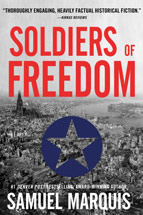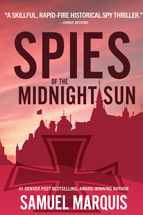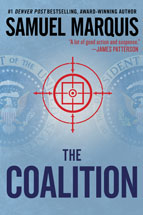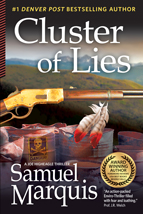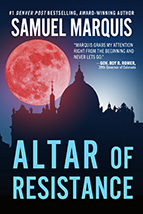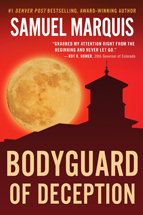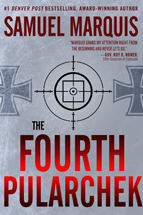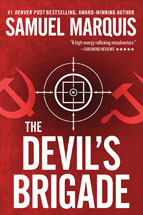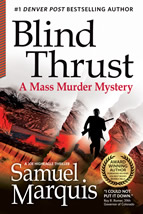Skyler the Assassin in The Coalition by Samuel Marquis
“The Coalition has a lot of good action and suspense [and] an unusual female assassin…”—James Patterson, #1 New York Times Bestselling Author
“[The Coalition’s] biggest draw is the fascinating Skyler…Abused by men, she channels her anger into increasingly impressive assassinations. In her down time, she prowls for one-night stands that border on violent and are sometimes nearly fatal. Skyler deftly evades capture by convincing the world that the sniper they seek is a man, even planting hair from the men she sleeps with in service of this deceit.—Foreword Reviews (4-Star-Review)
“Skyler is a convincing sniper, and also a nicely conflicted one.”—Donald Maass, Author of Writing 21st Century Fiction
“The assassin [Skyler] is particularly engaging and unique: a female assassin who is an expert markswoman, but who is also deeply conflicted.”—Self-Publishing Review (4-Star-Review)
When I wrote my political assassination thriller The Coalition, I had intended the novel to be a standalone work and the clever, beautiful, and damaged Italian assassin, Skyler (real name Angela Ferrara) to be a single-time character. But readers and reviewers seem to want more of Skyler, and they also want to know her haunted backstory in more intimate detail. As John M. Murray of Foreword Reviews said, “Skyler is a unique character, though additional backstory, especially related to how she became a sniper, is missed.” Well, in fact, I wrote a detailed backstory for Skyler and included it in an earlier incarnation of the novel, but it was subsequently removed on the recommendation of my literary agent at the time to maintain a taut pacing. Below I have reproduced the backstory as originally written for those who are interested in knowing more about Skyler and particularly how she became a world-class long-range sniper. I hope you enjoy it; I certainly enjoyed creating her as a character.
Oh, and by the way, I think it’s safe to say that we’ll be seeing Skyler again.
In fact, she is scheduled to make her reappearance in the third book in the Joseph Higheagle Environmental Sleuth Series. The question is will Skyler and Joe Higheagle go toe to toe against one another, or will they team up and kick some serious ass? And will Joe’s curmudgeonly grandfather, Chief John Higheagle, be in the mix with his trusty Winchester repeating rifle?
Even I don’t know the answers to those questions, yet.
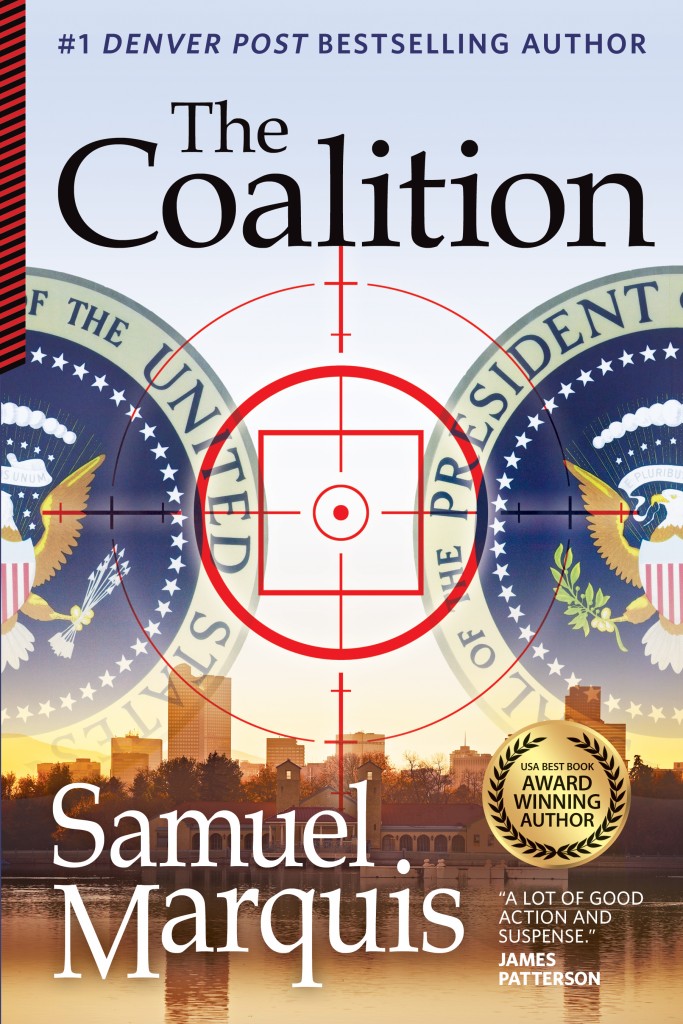
THE ANGELA FERRARA (SKYLER) BACKSTORY
SAMUEL MARQUIS – THE COALITION
AUTHOR’S CUT
The next morning, Skyler gazed out at the Pacific Ocean, took a deep breath of the rich sea air, redolent with antiquity, and pulled her Nikon from her camera bag to take some pictures.
She clicked some shots of the water first. The sunlight sparkled off its cobalt blue surface, gently rippled by the light breeze. She zoomed in and clicked away at a small armada of floating pelicans then a pair of frolicking sea lions. Turning her camera to the southwest, she took a few photographs of the pier before returning the camera to her bag. Discrete dealers in Paris and Los Angeles pressed her to exhibit her work, but she preferred to sell only individual shots on a rare basis. Though she was a superior photographer to the vast majority of those working for the major magazines, photography was essentially a hobby for her.
Being an assassin came first.
Heading from the beach, she walked through the pavilion and then through a little back street to Andoletto’s, an upscale breakfast eatery she enjoyed. Once seated, she surveyed the room’s broad expanse, looking for prying eyes, someone familiar or threatening. Seeing no one suspicious, she turned her attention to the mouth-watering menu. A waiter in a stiff white shirt and neat bow tie came to take her order. She ordered two large glasses of fresh-squeezed orange juice and pan-seared Sierra Nevada trout, served with two poached eggs, parsley potatoes, and Meunière butter.
When the waiter walked off, she pulled out her Los Angeles Times and scanned the lead stories. President Forsythe’s address last night was being met with extreme skepticism, according to a national CNN poll. Reportedly a whopping eighty-eight percent of Americans believed he was lying about his association with the Green Freedom Brigade, seventy-one percent believed he was personally involved in the assassination, and sixty-four percent thought the Democrats in Congress were part of the whole thing. Obviously, the men who had hired her weren’t satisfied with eliminating Rollins, they were trying to take Forsythe and the Democrats down as well.
She perused several more articles. There was little new information on the FBI’s case. The paper simply said the federal task force was piecing together all the physical evidence, performing DNA analysis, and conducting interviews with potential suspects and material witnesses. It was obvious the authorities were no closer to finding a plausible suspect than yesterday. This was good but expected news. In her view, the Bureau was a laughable organization, dominated by lame-brained alpha males overloaded with testosterone.
When her breakfast arrived, she picked up her fork and began eating her trout. Her thoughts turned to David Goldberg. She wondered if he really would show up to her apartment tonight to take her out to dinner. On one level, she hoped he would, but on another, she was scared. In her line of work, she couldn’t afford to get close to anyone.
That was the way it had been since Don Scarpello and Alberto.
Reaffirming the dictum that life is seldom simple and often messy, Angela Valentina Ferrara wasn’t born an assassin, nor did she show any early warning signs of someone who would pursue a life of violence. The daughter of one of Florence’s finest families, she grew up in a climate of aristocracy—a world of resplendent art, influential personages, and second homes. It wasn’t until her teenage years that her stable cosmos began to unravel and she was drawn—some might say pushed—toward a darker side.
Her father was a reputable architect, her mother an art collector and woman of culture known for throwing the most lavish parties in all of Tuscany. Angela, her two brothers, and three sisters grew up in a happy close-knit Roman Catholic family, with every comfort unlimited resources could provide. Art, like religion, was central to the family. The city of Florence was perhaps the world’s most prestigious art institute, and the Ferraras took great pride in its colorful history. Seldom a month passed when Benedetto and Constantina Ferrara didn’t take Angela and their other children to study the deft brushstrokes of Botticelli and Da Vinci, the chiseled wonders of Michelangelo, the architectural grandeur of Giotto and Brunelleschi.
It was from her mother’s influence that Angela developed an abiding interest in reading and helping out the disadvantaged. The family supported the underprivileged of Florence in a wide variety of ways: sponsoring food drives and art auctions to raise money for the homeless, providing academic scholarships, and donating generously to several Catholic charities.
This was the world in which Angela was raised: a world of generosity toward those less fortunate, piousness, and an idealistic faith that people were basically good. By her fifteenth birthday, she was a charitable Catholic girl, an exceptional student, an accomplished pianist, and a talented athlete.
Then, within the next six months, Angela’s perfect world began to fall apart.
It began the night of her parent’s big gala. She had just finished greeting her parents’ guests and returned to her bedroom to finish her homework. The room was on the second floor of the palatial home, at the end of a long hallway and away from the party. Unbeknownst to her, Don Scarpello studied her movements closely as she went upstairs, then followed her. He was a wealthy banker who did business with her father. Both were much respected men in Florence, though it was well known that Don Scarpello had a wandering eye.
When he entered her room, he politely asked if he could use the gabinetto. The downstairs bathrooms were occupied, he said, and he had imbibed a little too much wine and needed to relieve himself urgently. Angela knew Don Scarpello was a powerful man in Florence, and though his request seemed peculiar, she had been taught by her parents and Catholic schooling to be obedient to her elders. She showed him to the bathroom and returned to her desk.
It was a bad night to be alone. Her two older brothers and sisters were away at college, her younger sister was staying at a friend’s house, and the house servants were busy with the party.
Suddenly, she heard a groan and the bathroom door swung open. Don Scarpello filled the doorway, clutching his chest and crying out for help. My God, she thought, he’s having a heart attack! She rose from her chair and rushed to his aid.
As she reached out to help him, she realized something was terribly wrong. There was a look in his eyes like a wild dog.
He grabbed her in a bear hug. As she struggled to pull away, he spun her around and clasped a hairy-knuckled hand over her mouth. Then he carried her into the bathroom.
She tried to fight him off, but he was too strong, his grip like a vice.
Keeping his hand cupped over her mouth to keep her from crying out, he pushed her to the sink and doubled her over. A meaty hand slid up her skirt and jerked down her panties.
It was then he sneered the words she would never forget: “Yes, I am going to hurt you. But you will like it.”
He shoved his way inside her and began thrusting violently. She tried to break free, but he pinned her against the sink. It seemed unfathomable that this could be happening to her. Yet what tortured her most of all was the sound of Don Scarpello’s heavy panting, like a dog.
For a moment, she wanted to die.
Finally, her rapist let out a low groan and she saw his face in the mirror, grotesquely contorted in a rictus of pain and pleasure.
Then the savage shaking stopped.
He removed his hand from her mouth slowly then whispered to her in a voice that sent chills down her spine. “You wanted it, didn’t you? You wanted me badly.”
Terrified out of her mind, she didn’t answer.
He jerked her head back. “You must speak when you are spoken to.”
“Yes, yes!” she cried. “I wanted you!”
“Not so loud, girl,” he whispered harshly, slipping his meaty hand over her mouth again. “You can never tell anyone what happened here tonight. No one would believe you anyway. They’d call you a little whore. So you won’t say anything, will you?”
She tried to nod, but he pulled her head back sharply before she could.
“If you tell, I will strangle you with these strong hands. Do you hear me, girl? I will strangle you. Then I will come for your father and mother.”
She nodded again, praying desperately he would just leave her alone.
“There is no evidence, you see. I wore a condom. Thoughtful of me, wasn’t it? You won’t get pregnant from Don Scarpello’s seed.”
He withdrew himself, and in the reflection of the mirror, she saw him pull off the soggy, dripping condom. Flushing it down the toilet, he turned back toward her with a smirk of triumph.
It was a look Angela would never forget for the rest of her life.
She was too ashamed and frightened of what Don Scarpello might do to her and her family to tell her parents about the incident. Instead, she kept her feelings corked inside. Over the next few months, her suffering began to manifest itself in a variety of ways. Her grades plummeted and her enthusiasm for sports dwindled. Her attempts to steer clear of the boys in her class became so obvious they began to taunt her. Her girlfriends abandoned her, claiming she was no fun anymore. Her parents tried to help, sending her to Father Colucci, talking with her teachers, devoting extra attention to her, but their efforts were in vain. She became more withdrawn, moody, and rebellious.
By her final year in secondary school, Angela was a bitter outcast, well on her way to developing a strong antisocial personality. Despite her mediocre performance in school compared to her previous standards, she managed to do above average work and was accepted to the University of Rome. It was there she met Alberto and was drawn to a life of crime.
She saw him for the first time at one of the cafés near the campus where the armchair anarchists, socialists, and revolutionaries hung out. Despite her burgeoning hatred of the opposite sex, she couldn’t help but notice him. He moved on the balls of his feet and his eyes sparkled with passion. He spoke knowledgeably about the cruelty of the ruling classes, the polizia, the government. But most important, he was kind, so different from the perverted boys that had tormented her in school and the overweening men of her father’s upper crust circles.
He didn’t approach her at the time. It was only after she had begun frequenting the café on a regular basis that they met. Despite her animosity towards men, she was taken in by Alberto Como’s powerful charm. They soon began spending a lot of time together, attending protests, meeting in secret with underground revolutionaries. Disillusioned with the world, rebellious and impressionable, young Angela was ripe for manipulation and indoctrination.
Within two months, she had dropped out of school, was living with Alberto, and had joined People for the Liberation of the Proletariat (PLP), a newly formed offshoot of the Italian Red Brigade. Undergoing extensive training, she was soon proficient in the use of small arms, surveillance, basic explosives, disguise, and photography, the latter at which she particularly excelled. She genuinely believed she was fighting for a noble cause, and saw herself not as a terrorist, but a freedom fighter. Her emotional attachment to Alberto grew; he and the PLP became her new family.
It was in her third year that she was called upon for violent action. The target was Gustavo Testa, a high-ranking public official who was launching a crusade against the Mafia and various terrorist cells. It was rare that PLP and the Mafia joined forces, but they had agreed to put aside their differences for a common goal. Testa would be vacationing in Monaco for the week and the hit was to take place in front of his hotel, when he left to dine out for the evening.
Angela had demonstrated exceptional accuracy with a long-range rifle in target practice, and it was her job to cover Alberto’s retreat after he swept in on his motorcycle and killed Testa at close range. As it turned out, nothing went according to plan and Angela was forced to improvise.
The scene would always unfold like a silent motion picture to her. She remembered Testa and his bodyguards stepping cautiously out the front door, the sunlight catching their faces. Hearing the rumbling sound of the motorcycle, their expressions changed and they turned in unison toward the oncoming machine, fifty meters away and closing fast. There was a moment of uncertainty as the bodyguards tried to gauge whether the man racing toward them posed a threat, then, erring on the side of caution, they went for their guns. Angela felt a momentary sense of panic as she realized the element of surprise was lost and Alberto might be killed.
Summoning a calm she didn’t know she possessed, she placed the crosshairs on the first bodyguard, just as he withdrew his gun, and squeezed the trigger. There was a spurt of blood, his gun hand went limp, and the semiauto dropped harmlessly to the sidewalk. She swung the rifle over and locked onto Testa. The first bullet pierced his heart; the second, as he fell, drove into his brain, killing him before he hit the ground. Sighting the bodyguards again, Angela poured in heavily concentrated but harmless fire at their feet as they dove for cover behind a nearby Citröen. Her final image was of Alberto blazing past the hotel, his body crouched down low like a horseman at the Palio di Siena to avoid counterfire that never came.
Within the PLP Angela was heralded as a hero. The killing brought her satisfaction for all the wrongs done to her. She wanted to kill again, and she chose as her target the man who had originally set off her anger at the world: Don Scarpello. She didn’t ask for permission from, nor was the hit sanctioned by, PLP. She performed the surgical strike alone at night, zooming in on her motorcycle just like Alberto, shooting Don Scarpello twice in the face at point-blank range.
When she told Alberto and the other PLP chieftains what she’d done, they were furious at her. Field operatives were not allowed to carry out lone wolf actions that might expose the group to the police. In the wake of the Testa assassination, PLP was being pursued with a vengeance and putting the group in jeopardy was considered an egregious offense. The fact that, for a second time, a motorcycle had been involved only made things worse. Angela’s apologies to the group and promise to never make such a mistake again fell on deaf ears.
Less than a month later, they tried to get rid of her.
In retrospect, she should have realized she was being set up when she drew the assignment to deliver a bomb to a police refueling depot in Naples only a month after killing Don Scarpello. The bomb was supposed to explode five minutes after she activated the timer, but instead went off after only thirty seconds. If not for the protection afforded by a heavily armored urban assault vehicle parked at the depot, she would have been blown to bits.
She knew the instant it happened that Alberto had betrayed her.
After the incident, she secluded herself at her parents’ vacation home on Stromboli. In the torrid heat of August, they were not expected for six weeks. Every day she walked along the black sandy beaches, swam in the azure blue water, and tried to make sense of what had happened.
She realized that Alberto had considered her expendable all along. Terrorist cells often preyed on angry young students like her to achieve their political ends and he had considered her nothing more than a qualified recruit, a loyal footsoldier. She wished she had not given so much of herself to him. She had shared his bed, cooked his meals, loved him as much as any woman could love a man. And yet, through it all, she had been nothing more than a pawn in his eyes.
She tried to figure out what to do with herself. At twenty-one, she was young enough to put her past behind her and go on to lead a productive life. The only problem was she now posed an unacceptable security risk. Alberto and the others were sure to come looking for her. They would hunt her down and kill her like a dog.
There was another problem: she found she liked being an assassin. She was beginning to think of herself as a professional. More importantly, her job allowed her to take revenge against men. They were the ones to blame for setting her down this path—and now she had the opportunity to make them pay, again and again, for what they’d done to her. She didn’t need to get out of the game; what she needed were some new male targets—and protection.
As luck would have it, she was given both.
His name was Charles Xavier and he ran operations for the National Defense General Secretariat, better known as the French intelligence service. He came to the villa one afternoon, accompanied by three heavily armed men, and surprised her in the kitchen.
He was not here to arrest or kill her, he said, but to strike a business arrangement. He told her that Alberto Como and several high-ranking members of PLP had been arrested in connection with the assassination of Gustavo Testa. From a discrete source, he had learned that Angela was the sniper in the incident. He was impressed with her shooting skill and was interested in taking on a woman of her obvious talents under his umbrella. In a calm voice, he gave her a choice: come work for him, and gain all the protection and anonymity a man in his position could offer, or go to prison for life.
He gave her five minutes to decide.
Despite her distrust of the Frenchman, she had no choice but to accept. She went to work soon after as a nonofficial cover asset of French intelligence, which meant that if caught, the general secretariat would deny any association to her. Xavier outfitted her with the latest James Bond gadgets and computer hardware. Her first target was a German industrialist who had stolen important nuclear fusion secrets from a French R&D firm. Afterward, Xavier lowered his commission from fifty to twenty-five percent and set her up in a safe house in Paris. This was just the beginning for he had big plans for her.
Over the years, Xavier fed Interpol and the world’s intelligence community misleading tidbits of information on his prized assassin. The fictitious Diego Gomez, reportedly a medium-built Spaniard in his late thirties to mid-forties, became the man sought for the majority of her hits. He was purported to be an independent contractor working mostly for the Basque separatist movement Euskara. For years, the mystery man appeared on the international watch lists, but there was not a single high-quality photograph or police artist’s sketch of him. Over the same period, Angela was never brought in for questioning and no photograph or sketch of her face appeared on any Interpol alert. As a contract killer, she simply didn’t exist.
Xavier eventually retired from his post and went into private practice, becoming Angela’s control agent. Despite her hatred of men, she found him a fair person and their business partnership proved beneficial to both parties. He set her up with false passports, credit cards, and identity papers and continued to supply false clues to the growing Gomez legend, keeping her safe from the authorities. His contacts on both sides of the law brought in steady work. Meanwhile, she performed her assignments with methodical coolness. Her only rule: no women or children.
Over the years, as the body count steadily grew along with her numbered Swiss bank account, Angela’s hatred of the opposite sex never waned. In the face of every man she was about to kill, she always saw first Don Scarpello, then Alberto. And then she squeezed the trigger.
The trigger of hate and revenge.




